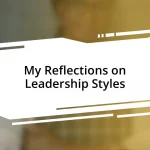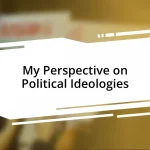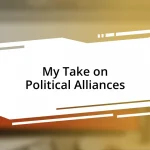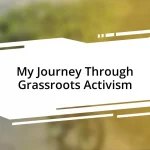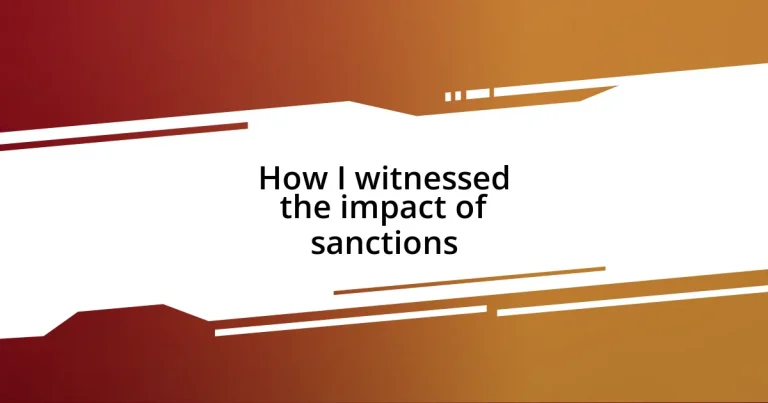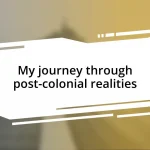Key takeaways:
- Economic sanctions lead to severe shortages of essentials, impacting healthcare and daily life, as seen in Iraq and Cuba.
- Personal stories reveal emotional and psychological tolls, highlighting the human suffering behind political decisions.
- Communities often unite to create support networks and innovative solutions, demonstrating resilience amid hardship.
- Empathy and understanding individual experiences behind sanctions are crucial for fostering compassion and promoting meaningful change.
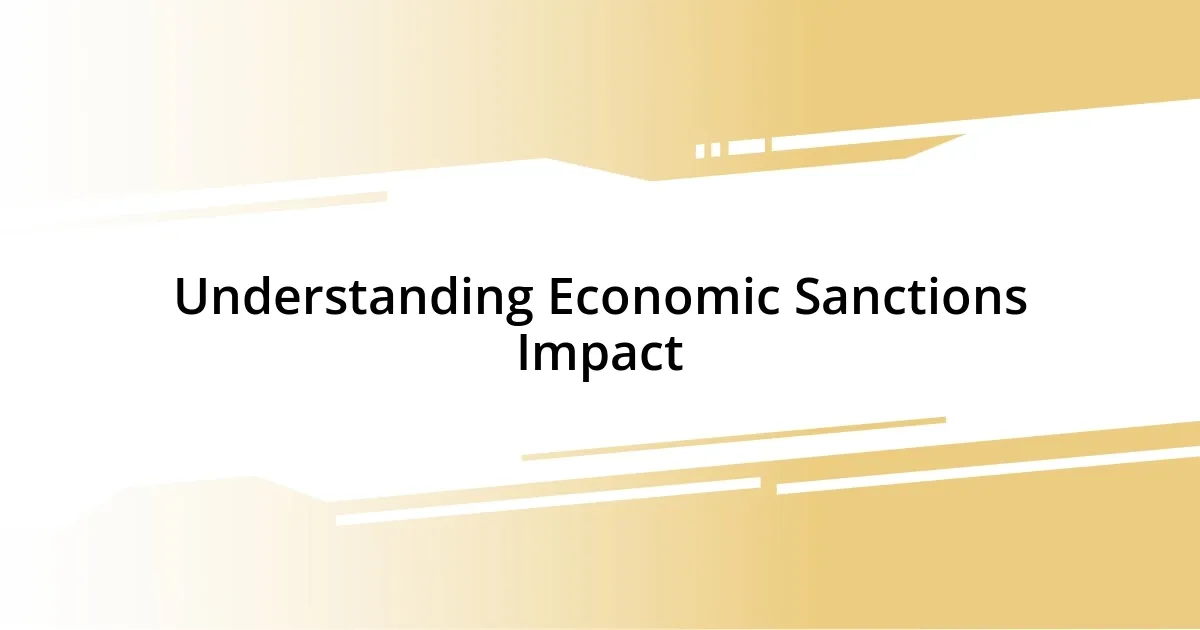
Understanding Economic Sanctions Impact
The impact of economic sanctions can be profound and multifaceted. I remember a time when I witnessed a close friend’s family struggling financially due to sanctions imposed on their country. It struck me how such measures ripple through the lives of ordinary people. How do we balance political objectives with the immediate human cost?
In my experience, the consequences often extend beyond mere economic hardship. For instance, healthcare systems can deteriorate, resulting in a lack of essential medications. Imagine facing a health crisis and finding out your medicine is no longer available because of sanctions. The frustration and helplessness are palpable, aren’t they?
Moreover, I have seen communities grow divided in their responses to sanctions—some support them, believing they promote justice, while others suffer silently, their voices drowned out. This dichotomy raises important questions: Who truly gains from these sanctions, and at what cost? Understanding these impacts invites us to look closer at the human side of international policy.

Historical Examples of Sanctions Effects
Sanctions have a long history of shaping nations and their citizen’s lives, often with devastating effects. I recall discussing with an elderly neighbor whose family fled Iraq during the sanctions of the 1990s. Their stories of shortages—of food, medicine, and even basic necessities—were vivid reminders of how political decisions can fracture lives and families.
Digging deeper into the repercussions of sanctions, I think of the case of South Africa during the apartheid era. The international sanctions aimed at dismantling a brutal regime had dual effects. While they pressured the government to change, everyday citizens dealt with severe shortages and increased violence. It was a potent example of how the struggle for justice can come with heavy collateral damage.
A poignant illustration of these varied impacts can be seen in Cuba after sanctions were imposed in the early 1960s. Families I interacted with shared stories of ingenuity, relying on resourcefulness to subsist amid scarcity. This resilience was inspiring, yet it also highlighted the lengths to which people had to go to survive. Their narratives linger with me as I reflect on the human cost behind such policies.
| Country | Year | Effects on Citizens |
|---|---|---|
| Iraq | 1990s | Severe shortages of food and medicine, family displacement |
| South Africa | 1980s | Pressure for change but increased violence and shortages |
| Cuba | 1960s | Resourcefulness in face of scarcity, struggles in daily life |
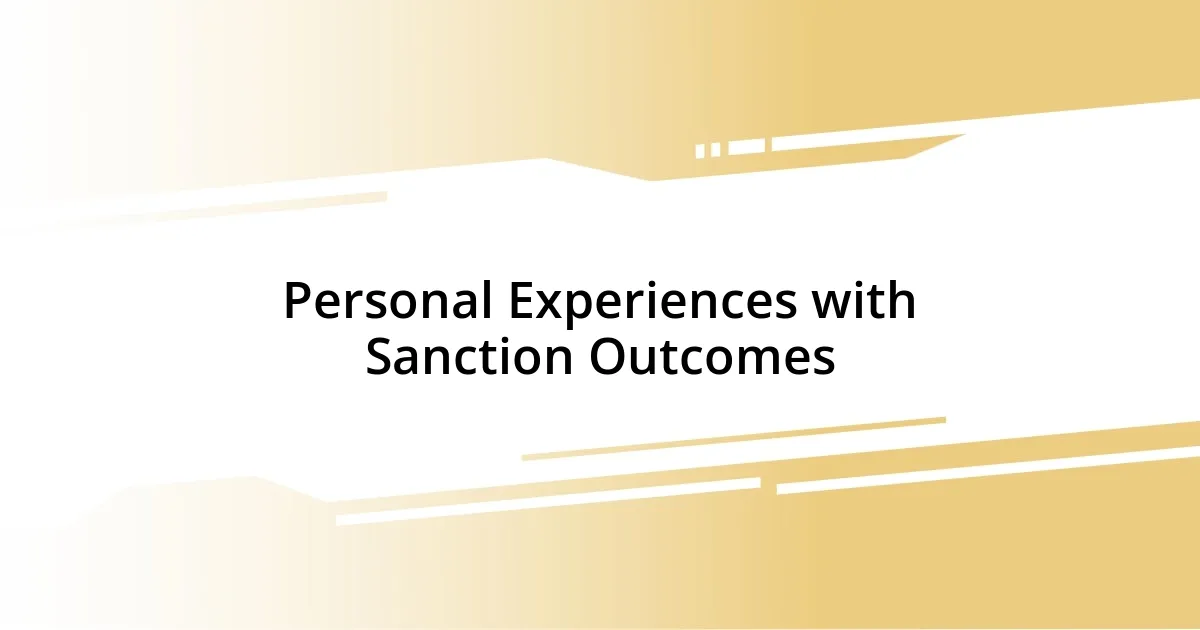
Personal Experiences with Sanction Outcomes
I have seen firsthand the toll that sanctions can take on families. One evening, I sat with a friend whose father had lost his small business due to trade restrictions. The helplessness in his voice as he recounted their struggles was heartbreaking. It made me realize that the impacts of sanctions are not just theoretical; they manifest in very tangible ways in people’s lives.
- Families face increasing financial strain, often leading to difficult choices about basic necessities.
- Children may miss out on education as their parents work multiple jobs just to make ends meet.
- Emotional health deteriorates, with stress and uncertainty becoming daily companions.
Similarly, my cousin lived abroad during a time of strict economic sanctions in her home country. She reminisced about receiving desperate phone calls from her relatives searching for basic food items, as they resorted to bartering for goods. Witnessing her emotional struggle, the frustration of feeling powerless, and her fierce desire to support them, deeply affected me. It’s in these personal connections that I found the most profound understanding of sanctions—it’s the people and their stories that get lost in the broader political narrative.
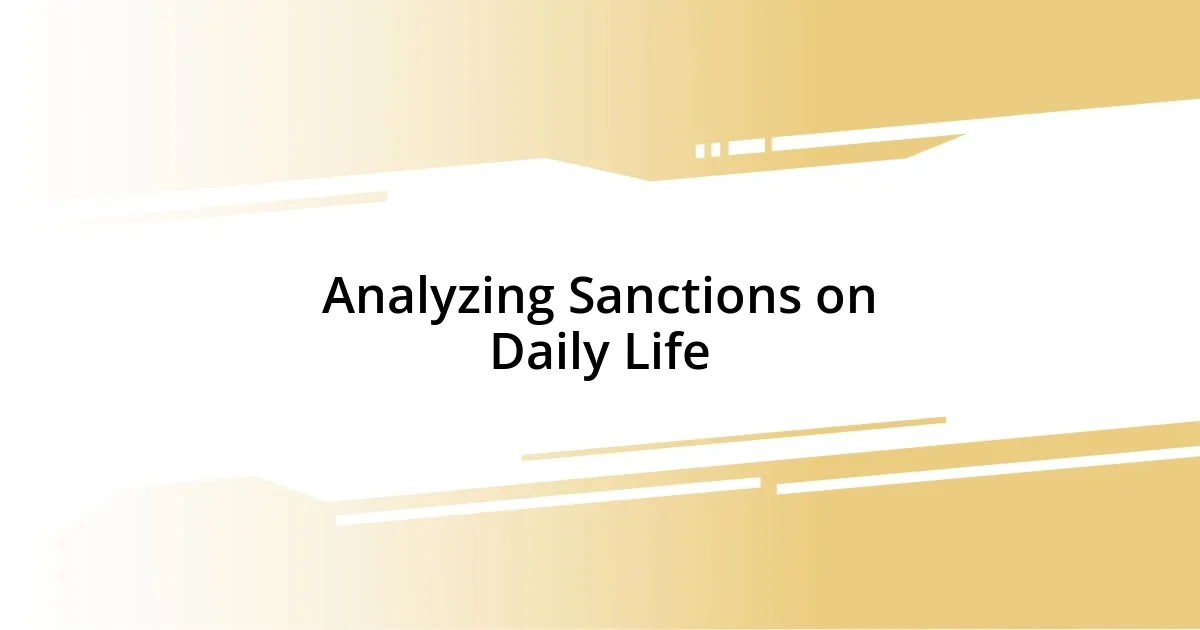
Analyzing Sanctions on Daily Life
Analyzing the daily effects of sanctions unveils a stark reality that many people face. I recall a particularly poignant moment when I visited a friend’s household during a time of heavy sanctions. Their kitchen was almost empty, and they were counting every grain of rice. It made me wonder—how does one maintain hope in such times of scarcity?
Experiencing the emotional aftermath of these policies has also struck me deeply. There was a young mother I met who teared up as she shared stories of her children’s hunger pangs. She’d line up for hours, sometimes going home empty-handed. The desperation in her eyes spoke volumes—sanctions aren’t just economic tools; they cut deep into the fabric of families, creating rifts between hope and reality.
From my perspective, the long-term psychological toll can be just as damaging as the immediate physical shortages. I think of the numerous conversations I had with people who felt an overwhelming sense of powerlessness. Wouldn’t you feel lost if your basic needs hinged on distant political decisions? It’s a haunting thought, and it reinforces the idea that behind every statistic is a human story—complex and filled with pain.
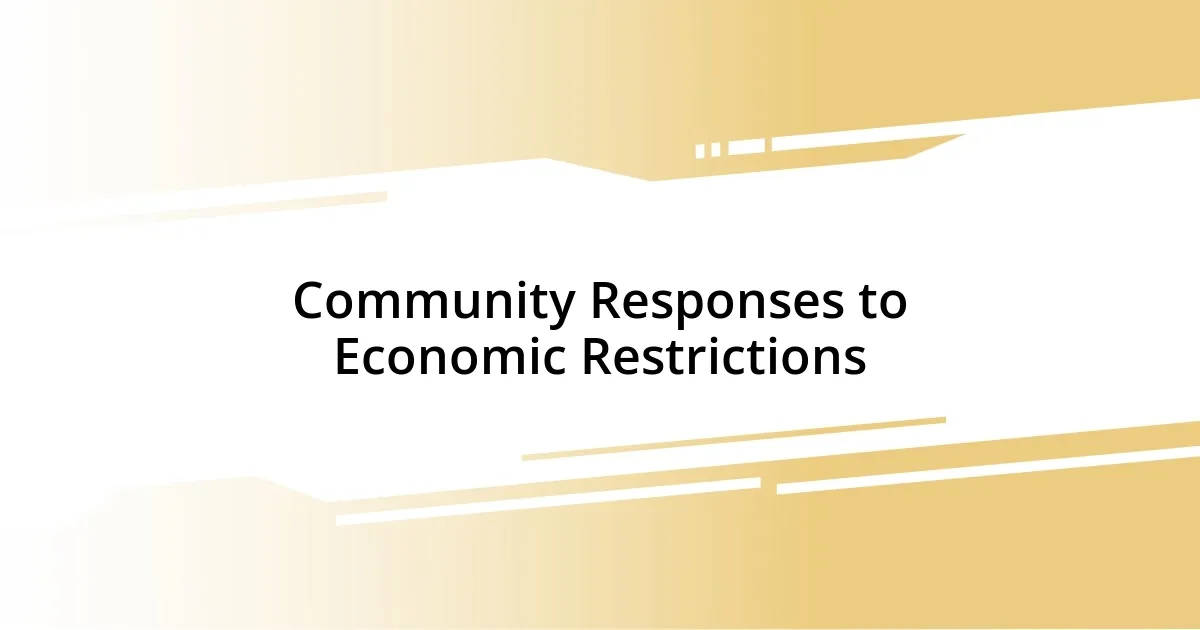
Community Responses to Economic Restrictions
Communities often come together in the face of economic restrictions, creating networks of support that can be life-saving. I remember visiting a neighborhood that banded together to form a small cooperative. They pooled resources to buy food in bulk and then distributed it among themselves. Watching this communal effort unfold filled me with hope, as it showcased their resilience and determination to combat the isolation that sanctions can create.
At times, those crumbling economic conditions push individuals to be extraordinarily creative. A talented friend of mine started a local barter system that turned into a thriving market. This initiative allowed people to exchange goods and services, which fostered trust and camaraderie. It’s uplifting to see how, even in adversity, communities can ignite sparks of ingenuity that allow them to rebuild and adapt to their new realities.
However, the emotional toll of remaining strong can weigh heavily on these communities. I once overheard a group discussing their fears about the future, each voice tinged with uncertainty. They laughed to hide their pain, but the cracks began to show as they shared stories of missed opportunities and lost dreams. It made me ponder: how much can people endure before the weight of sanctions becomes too much? Their struggle for normalcy amidst chaos serves as a striking reminder of the human spirit’s endurance.
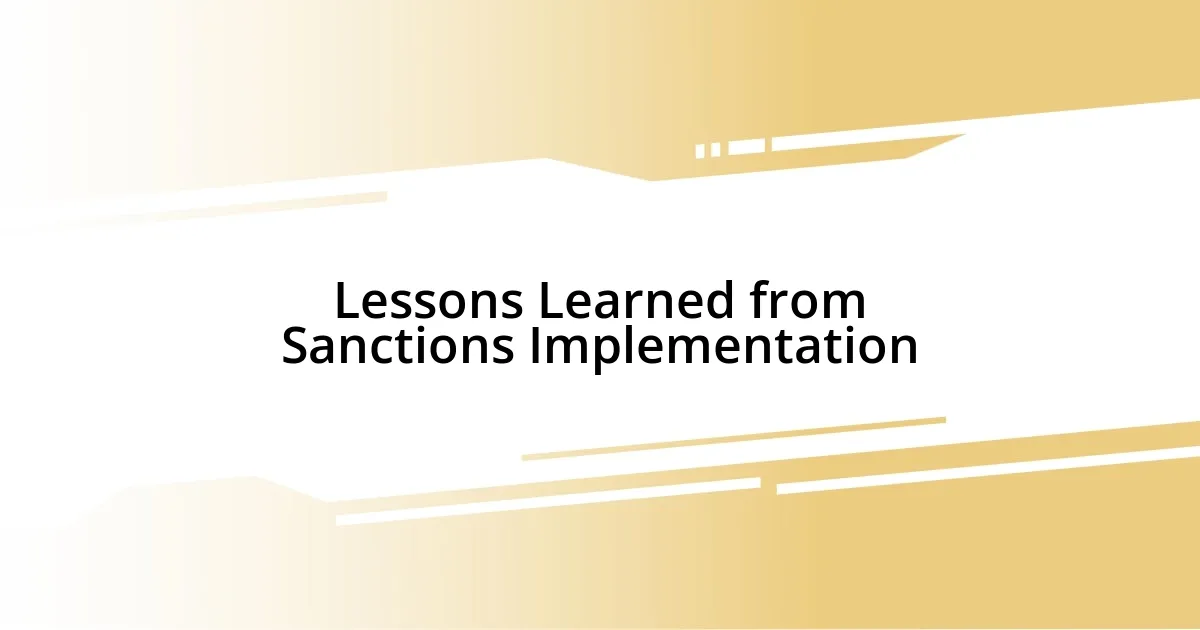
Lessons Learned from Sanctions Implementation
I’ve learned that sanctions don’t just shift economies; they alter everyday life in deeply personal ways. During my own experience, I stumbled upon a small marketplace where vendors were selling homemade goods. I stood mesmerized as a woman sold woven bags crafted from recycled materials. Watching her smile as she explained her art was a powerful reminder that resilience often blooms in unexpected places. It’s fascinating how creativity emerges as a coping mechanism, isn’t it?
The complexity of human relationships also becomes pronounced during times of sanctions. I recall speaking with a retired teacher who could no longer afford books for her students. Instead of despairing, she organized reading circles in her living room, fostering a space for learning and connection. It made me realize that sometimes, the spirit of community can shine even brighter when faced with adversity. How can such determination not inspire us to view challenges as opportunities for growth?
One major lesson is the importance of empathy. I witnessed countless families struggle not only with material shortages but also with the loss of dignity. A man I met spoke about how he used to take pride in providing for his family, but sanctions stripped that away. The longing in his voice was palpable, forcing me to reflect—what does it mean to truly support someone in their hardships? Understanding the human stories behind sanctions is essential; it lays the groundwork for compassion and ultimately for meaningful change.





